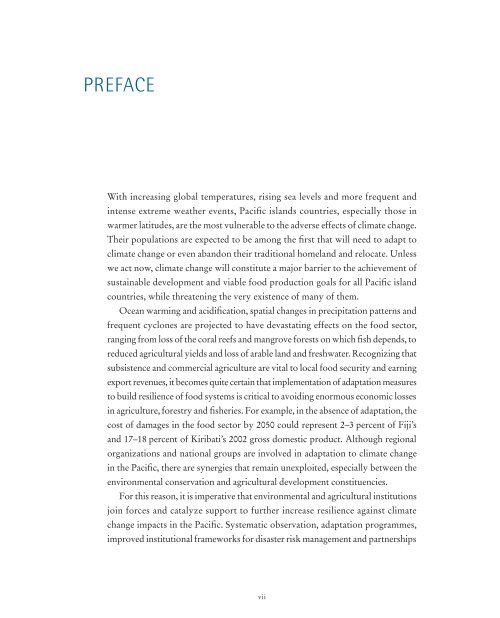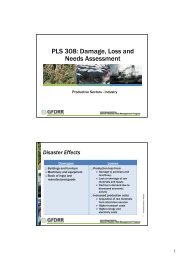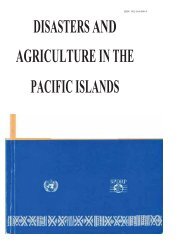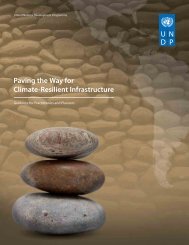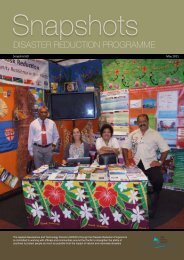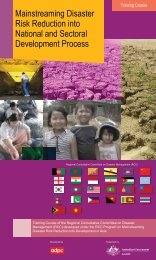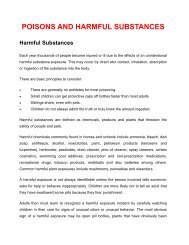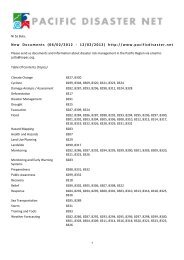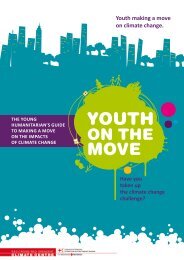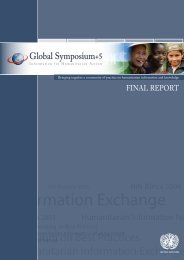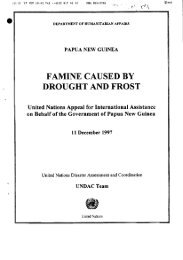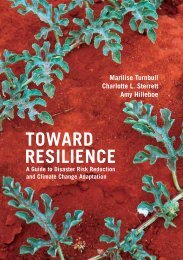- Page 8 and 9: CLIMATE CHANGE AND FOOD SECURITY IN
- Page 10 and 11: CLIMATE CHANGE AND FOOD SECURITY IN
- Page 13 and 14: CLIMATE CHANGE ANDFOOD SECURITY INP
- Page 15 and 16: CLIMATE CHANGE AND FOOD SECURITY IN
- Page 17 and 18: CLIMATE CHANGE AND FOOD SECURITY IN
- Page 19 and 20: CLIMATE CHANGE AND FOOD SECURITY IN
- Page 21 and 22: CLIMATE CHANGE AND FOOD SECURITY IN
- Page 23 and 24: CLIMATE CHANGE AND FOOD SECURITY IN
- Page 25 and 26: CLIMATE CHANGE AND FOOD SECURITY IN
- Page 27 and 28: CLIMATE CHANGE AND FOOD SECURITY IN
- Page 29 and 30: CLIMATE CHANGE AND FOOD SECURITY IN
- Page 31 and 32: CLIMATE CHANGE AND FOOD SECURITY IN
- Page 33 and 34: CLIMATE CHANGE AND FOOD SECURITY IN
- Page 35 and 36: CLIMATE CHANGE AND FOOD SECURITY IN
- Page 37 and 38: AN ASSESSMENT OF THE IMPACT OF CLIM
- Page 40 and 41: CLIMATE CHANGE AND FOOD SECURITY IN
- Page 42 and 43: CLIMATE CHANGE AND FOOD SECURITY IN
- Page 44 and 45: CLIMATE CHANGE AND FOOD SECURITY IN
- Page 46 and 47: CLIMATE CHANGE AND FOOD SECURITY IN
- Page 48 and 49: CLIMATE CHANGE AND FOOD SECURITY IN
- Page 50 and 51: CLIMATE CHANGE AND FOOD SECURITY IN
- Page 52 and 53:
CLIMATE CHANGE AND FOOD SECURITY IN
- Page 54 and 55:
CLIMATE CHANGE AND FOOD SECURITY IN
- Page 56 and 57:
CLIMATE CHANGE AND FOOD SECURITY IN
- Page 58 and 59:
CLIMATE CHANGE AND FOOD SECURITY IN
- Page 60 and 61:
CLIMATE CHANGE AND FOOD SECURITY IN
- Page 62 and 63:
CLIMATE CHANGE AND FOOD SECURITY IN
- Page 64 and 65:
CLIMATE CHANGE AND FOOD SECURITY IN
- Page 66 and 67:
CLIMATE CHANGE AND FOOD SECURITY IN
- Page 68 and 69:
CLIMATE CHANGE AND FOOD SECURITY IN
- Page 70 and 71:
CLIMATE CHANGE AND FOOD SECURITY IN
- Page 72 and 73:
CLIMATE CHANGE AND FOOD SECURITY IN
- Page 74 and 75:
CLIMATE CHANGE AND FOOD SECURITY IN
- Page 76 and 77:
CLIMATE CHANGE AND FOOD SECURITY IN
- Page 78 and 79:
CLIMATE CHANGE AND FOOD SECURITY IN
- Page 80 and 81:
CLIMATE CHANGE AND FOOD SECURITY IN
- Page 82 and 83:
CLIMATE CHANGE AND FOOD SECURITY IN
- Page 84 and 85:
CLIMATE CHANGE AND FOOD SECURITY IN
- Page 86 and 87:
CLIMATE CHANGE AND FOOD SECURITY IN
- Page 88 and 89:
CLIMATE CHANGE AND FOOD SECURITY IN
- Page 90 and 91:
CLIMATE CHANGE AND FOOD SECURITY IN
- Page 92 and 93:
CLIMATE CHANGE AND FOOD SECURITY IN
- Page 94 and 95:
CLIMATE CHANGE AND FOOD SECURITY IN
- Page 96 and 97:
CLIMATE CHANGE AND FOOD SECURITY IN
- Page 98 and 99:
CLIMATE CHANGE AND FOOD SECURITY IN
- Page 100 and 101:
CLIMATE CHANGE AND FOOD SECURITY IN
- Page 102 and 103:
CLIMATE CHANGE AND FOOD SECURITY IN
- Page 104 and 105:
CLIMATE CHANGE AND FOOD SECURITY IN
- Page 106 and 107:
CLIMATE CHANGE AND FOOD SECURITY IN
- Page 108:
CLIMATE CHANGE AND FOOD SECURITY IN
- Page 111 and 112:
AN ASSESSMENT OF THE IMPACT OF CLIM
- Page 113 and 114:
AN ASSESSMENT OF THE IMPACT OF CLIM
- Page 115 and 116:
AN ASSESSMENT OF THE IMPACT OF CLIM
- Page 117 and 118:
AN ASSESSMENT OF THE IMPACT OF CLIM
- Page 119 and 120:
AN ASSESSMENT OF THE IMPACT OF CLIM
- Page 121 and 122:
AN ASSESSMENT OF THE IMPACT OF CLIM
- Page 123 and 124:
AN ASSESSMENT OF THE IMPACT OF CLIM
- Page 125 and 126:
AN ASSESSMENT OF THE IMPACT OF CLIM
- Page 127 and 128:
AN ASSESSMENT OF THE IMPACT OF CLIM
- Page 129 and 130:
AN ASSESSMENT OF THE IMPACT OF CLIM
- Page 131 and 132:
AN ASSESSMENT OF THE IMPACT OF CLIM
- Page 133 and 134:
AN ASSESSMENT OF THE IMPACT OF CLIM
- Page 135 and 136:
AN ASSESSMENT OF THE IMPACT OF CLIM
- Page 137 and 138:
AN ASSESSMENT OF THE IMPACT OF CLIM
- Page 139 and 140:
AN ASSESSMENT OF THE IMPACT OF CLIM
- Page 141 and 142:
AN ASSESSMENT OF THE IMPACT OF CLIM
- Page 143 and 144:
AN ASSESSMENT OF THE IMPACT OF CLIM
- Page 145 and 146:
AN ASSESSMENT OF THE IMPACT OF CLIM
- Page 147 and 148:
AN ASSESSMENT OF THE IMPACT OF CLIM
- Page 149 and 150:
AN ASSESSMENT OF THE IMPACT OF CLIM
- Page 151 and 152:
AN ASSESSMENT OF THE IMPACT OF CLIM
- Page 153:
AN ASSESSMENT OF THE IMPACT OF CLIM
- Page 157 and 158:
AN ASSESSMENT OF THE IMPACT OF CLIM
- Page 159 and 160:
AN ASSESSMENT OF THE IMPACT OF CLIM
- Page 161 and 162:
AN ASSESSMENT OF THE IMPACT OF CLIM
- Page 163 and 164:
AN ASSESSMENT OF THE IMPACT OF CLIM
- Page 165 and 166:
AN ASSESSMENT OF THE IMPACT OF CLIM
- Page 167 and 168:
AN ASSESSMENT OF THE IMPACT OF CLIM
- Page 169 and 170:
AN ASSESSMENT OF THE IMPACT OF CLIM
- Page 171 and 172:
AN ASSESSMENT OF THE IMPACT OF CLIM
- Page 173 and 174:
AN ASSESSMENT OF THE IMPACT OF CLIM
- Page 175 and 176:
AN ASSESSMENT OF THE IMPACT OF CLIM
- Page 177 and 178:
AN ASSESSMENT OF THE IMPACT OF CLIM
- Page 179 and 180:
AN ASSESSMENT OF THE IMPACT OF CLIM
- Page 181 and 182:
AN ASSESSMENT OF THE IMPACT OF CLIM
- Page 183 and 184:
AN ASSESSMENT OF THE IMPACT OF CLIM
- Page 185 and 186:
AN ASSESSMENT OF THE IMPACT OF CLIM
- Page 187 and 188:
AN ASSESSMENT OF THE IMPACT OF CLIM
- Page 189 and 190:
AN ASSESSMENT OF THE IMPACT OF CLIM
- Page 191 and 192:
AN ASSESSMENT OF THE IMPACT OF CLIM
- Page 193 and 194:
AN ASSESSMENT OF THE IMPACT OF CLIM
- Page 195 and 196:
AN ASSESSMENT OF THE IMPACT OF CLIM
- Page 197 and 198:
AN ASSESSMENT OF THE IMPACT OF CLIM
- Page 199 and 200:
AN ASSESSMENT OF THE IMPACT OF CLIM
- Page 201 and 202:
AN ASSESSMENT OF THE IMPACT OF CLIM
- Page 203 and 204:
AN ASSESSMENT OF THE IMPACT OF CLIM
- Page 206 and 207:
CLIMATE CHANGE AND FOOD SECURITY IN
- Page 208 and 209:
CLIMATE CHANGE AND FOOD SECURITY IN
- Page 210 and 211:
CLIMATE CHANGE AND FOOD SECURITY IN
- Page 212 and 213:
CLIMATE CHANGE AND FOOD SECURITY IN
- Page 214 and 215:
CLIMATE CHANGE AND FOOD SECURITY IN
- Page 216 and 217:
CLIMATE CHANGE AND FOOD SECURITY IN
- Page 218 and 219:
CLIMATE CHANGE AND FOOD SECURITY IN
- Page 220 and 221:
CLIMATE CHANGE AND FOOD SECURITY IN
- Page 222 and 223:
CLIMATE CHANGE AND FOOD SECURITY IN
- Page 224 and 225:
CLIMATE CHANGE AND FOOD SECURITY IN
- Page 226 and 227:
CLIMATE CHANGE AND FOOD SECURITY IN
- Page 228 and 229:
CLIMATE CHANGE AND FOOD SECURITY IN
- Page 230 and 231:
CLIMATE CHANGE AND FOOD SECURITY IN
- Page 232 and 233:
CLIMATE CHANGE AND FOOD SECURITY IN
- Page 234 and 235:
CLIMATE CHANGE AND FOOD SECURITY IN
- Page 236 and 237:
CLIMATE CHANGE AND FOOD SECURITY IN
- Page 238 and 239:
CLIMATE CHANGE AND FOOD SECURITY IN
- Page 240 and 241:
CLIMATE CHANGE AND FOOD SECURITY IN
- Page 242 and 243:
CLIMATE CHANGE AND FOOD SECURITY IN
- Page 244 and 245:
CLIMATE CHANGE AND FOOD SECURITY IN
- Page 246 and 247:
CLIMATE CHANGE AND FOOD SECURITY IN
- Page 248 and 249:
CLIMATE CHANGE AND FOOD SECURITY IN
- Page 250 and 251:
CLIMATE CHANGE AND FOOD SECURITY IN
- Page 252 and 253:
CLIMATE CHANGE AND FOOD SECURITY IN
- Page 255 and 256:
THE REGIONAL EXPERT GROUP ON FOOD S
- Page 257 and 258:
THE REGIONAL EXPERT GROUP ON FOOD S
- Page 259 and 260:
THE REGIONAL EXPERT GROUP ON FOOD S
- Page 261 and 262:
THE REGIONAL EXPERT GROUP ON FOOD S
- Page 263 and 264:
THE REGIONAL EXPERT GROUP ON FOOD S
- Page 265 and 266:
THE REGIONAL EXPERT GROUP ON FOOD S
- Page 267 and 268:
THE REGIONAL EXPERT GROUP ON FOOD S
- Page 269:
THE REGIONAL EXPERT GROUP ON FOOD S
- Page 272 and 273:
CLIMATE CHANGE AND FOOD SECURITY IN
- Page 274 and 275:
CLIMATE CHANGE AND FOOD SECURITY IN
- Page 276 and 277:
CLIMATE CHANGE AND FOOD SECURITY IN
- Page 278 and 279:
CLIMATE CHANGE AND FOOD SECURITY IN
- Page 280:
www.fao.org/sids


